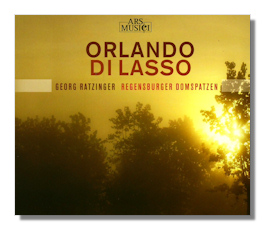
The Internet's Premier Classical Music Source
Related Links
- Lassus Reviews
- Latest Reviews
- More Reviews
-
By Composer
-
Collections
DVD & Blu-ray
Books
Concert Reviews
Articles/Interviews
Software
Audio
Search Amazon
Recommended Links
Site News
 CD Review
CD Review
Orlando di Lasso

Sacred & Secular Vocal Works
- Omnes de Saba
- Lauda Jerusalem
- Jubilate Deo omnis terra
- Benedicam Dominum
- Missa super "Bell'Amfitrit'altera"
- Quid vulgo memorant
- Ergo rex vivat
- Dic mihi quem portas
- Nunc gaudere licet
- Audite nova Der Bawr von Eselsskirchen
- Baur, was tregst im Sacke?
- Ich weiss mir ein meidlein hubsch und fein
- So trincken wir alle
- Wer frisch wil sein
Regensburger Domspatzen/Georg Ratzinger
Ars Musici 232166
The Regensburger Domspatzen cathedral school for boys choir was founded in 975 CE; that's 1,035 years ago. Its musical prowess (and reputation) have lasted – grown, indeed – over the centuries, putting it now in the front rank of choirs of its kind. This glorious CD with a slim 48 minutes of music by Lassus is ample evidence of their considerable singing achievements and makes enjoyable and stimulating listening. Their Musical Director, Georg Ratzinger, was born in 1924 and has distinguished theological, educational and musical career experience to call on. His specialities are actually the Romantic and folk-song repertoire.
And that style is evident in the way these wonderfully resonant and uplifting works by Lassus are performed here. The choir brings an almost rhetorical airiness and a detachment (in the way professional choirs so often perform folk music) to their interpretations. But there's nothing either perfunctory or exploratory about the way the choir approaches the music. They make it there own (listen to the short and impactful Dic mihi quem portas [tr.11], for example). They achieve a fluency and transparency of articulation with Lassus' texts. And they infuse the wholly geistliche (sacred) works, like the wonderful Mass with conviction and persuasion.
Specifically, the choir reflects well the blend that Lassus represented between Italian warmth, sensuality, excitement on the one hand; and Netherlandish calm and precision on the other. This is not to imply that the Regensburger Domspatzen in any way tempers a spontaneous waywardness with tart technique. But that they understand just how Lassus achieved such a fusion – even though at times they collectively may lack something of the Innigkeit which other specialist choirs use to communicate the composer's amazing intentions with all the genres to which he turned his hand.
At times their singing reminds us of Monteverdi, at others a little of Palestrina. This suggests that these musicians have struck a balance between grandeur and force. In each case the primacy of the text is respected and the delivery by (members of) the 50 or so strong choir is pleasingly clear and communicative. They retain, though, the style and flavor which they have developed over generations. This is particularly persuasive: you feel in capable and practiced hands as they make their way through each work and give it all the attention and care it deserves – but without ever resorting to exaggeration or hyperbole.
The acoustic is roomy though not boomy. The notes with the CD contain helpful background and the texts in (Latin and) German. This would probably not be the very best place to start if Lassus' choral polyphony is new to you. The notes hint that the CD is intended to be a sampler of the many styles used by Lassus. But as a highly competent window looking in on Lassus' world (more idiomatic accounts usually work by standing with Lassus and looking out), it's likely to provide some new insights.
Copyright © 2010, Mark Sealey.





















